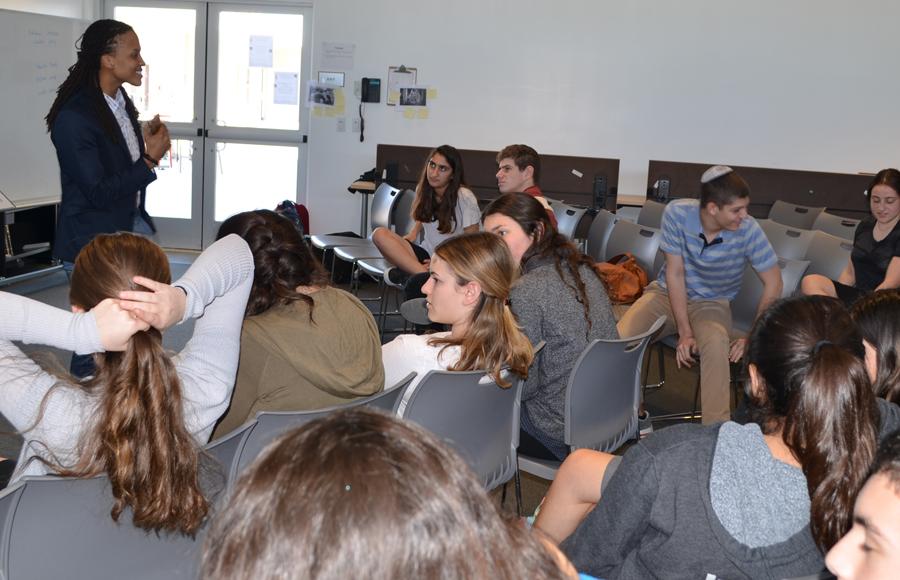Speaker leads three days of talks on race, fairness and equality. and why they matter
Is it moral to be comfortable when others suffer? Readings set stage for discussions with Thaly Germain.
May 24, 2016
In the large Beit Midrash, a hand flies into the air, and thoughts are shared on police brutality and how it can be solved. Disagreements are expressed on the direness of the issue. A student prompts the frequently asked question of how to balance being a leader with being a peer.
These thought-provoking discussions, as well as many others, were led by scholar-in-residence Thaly Germain, who visited Shalhevet April 4 – 6.
“I think the first step is making a difference in your immediate life,” Ms. Germain said. “You will practice skills of leadership by doing small things — if you see something happening you think is unequal or unfair, standing up for that.”
Ms. Germain, who is executive director of the Lynch Leadership Academy in Boston, led hour-long sessions with each grade during different periods of the school days, discussing issues of national inequality – she called it “inequity” — and the roles of the individual in repairing it.
In preparation for her sessions, Ms. Germain assigned each grade to read different documents relating to the issues that would be discussed.
The freshman, junior and senior classes read Dr. Martin Luther King’s “Letter From Birmingham Jail” and the freshmen also read Bowen McCoy’s “The Parable of the Sadhu.”
The sophomore class was assigned to read “The Ones Who Walk Away From Omelas” by Ursula K. Le Guinm, a story that features a utopian society in which one child must be tortured in order for the society to remain in its serene state.
This led to a discussion on privilege in society and whether it is the nature of privilege, and whether one group’s happiness demands the sacrifice of others.
“It made me sad that the moral of the story was that someone else needs to suffer in order for people to have a good life,” said sophomore Maia Zelkha. “It made me feel really helpless.”
The ninth grade watched video clips about racism and police brutality and discussed the documents they had read the previous day.
“I didn’t really know as much about the situation that was going on around the world with the police,” said freshman Mikey Kahtan. “It’s important to me now.”
On the first day of her visit, Ms. Germain focused her sessions with all grades on determining the value of the discussions.
The second day, Ms. Germain focused on topics of equity such as health care, access to resources, racial discrimination and interactions between police and communities of color.
“These are specific challenges that we’re facing as a nation,” Ms. Germain said. She told students to ask themselves “what’s my role in shaping the future of what happens.”
Ms. Germain has experience shaping her own future. Born in Port-Au-Prince, Haiti, she moved to Brooklyn, New York at the age of 10 and credits education with her success here.
“I had the experience of living in another country and seeing how an oppressive government could impact the outcome of a nation,” she said. “When I moved to the States, I was a non-English speaker and lived in a very poor community, and what really changed my life trajectory were the school leaders and teachers I had.”
She said that a sense of responsibility to create change were present in her mind from a young age.
“My moral compass was all about equity and making the world a better place,” Ms. Germain said. “I’m in the mindset of if I don’t, then maybe others won’t either.”
This mindset, along with taking on leadership opportunities, are two things she said teens should pursue in order to contribute to a more equitable world.
“Your voice is important, challenging people is important,” Ms. Germain said.
According to General Studies Principal Mr. Daniel Weslow, Ms. Germaine’s visit was part of the same scholar-in-residence program that has brought mainly Judaic Studies educators like Rav Judah Mischel to school.
“Rabbi Segal and I were looking for ways to incorporate a scholar-in-residence that could focus on areas of diversity and social justice, a program that mirrored Rav Judah who comes in on the Judaic staff,” Mr. Weslow said.
In preparation for the visit, an anonymous survey was posted to Schoology during the Town Hall of March 17. The survey assessed students’ views on various issues relating to diversity and their relevance to their lives.
“It provided another data point for her to become more familiar with the school culture and community, and It was important for her to get a sense of the school beyond the website,” Mr. Weslow explained.
The Lynch Leadership Academy is a five-year-old executive leadership program for school principals. Ms. Germain is its executive director.
“I spend a good bit of my time helping people to think about their role when it comes to leadership and when it comes to equity,” Ms. Germain said.
Although not quite knowing what to expect when she arrived, she described her visit as “fantastic.”
“I learned a lot,” she said. “The most powerful aspect of the experience was how willing people were to engage in meaningful conversations and to disagree with each other.”
Ms. Germain thought that her visit accomplished its goals.
“After each session, at least three to five people would come up to me to continue the conversation because they wanted to figure out their role moving forward,” she added. “That’s really promising.”
